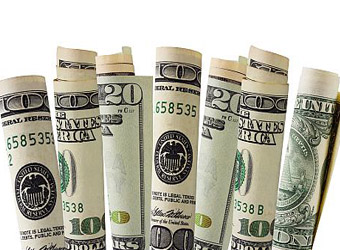Dollar prices were on tenterhooks, trading sideways against major rivals on Wednesday as investors awaited the outcome of the Federal Reserve’s meeting at which it was expected to announce plans to trim its $4.2 trillion in bond holdings.
The dollar index, which tracks the greenback against a basket of six major rivals, edged down 0.1 percent to 91.739, though it remained well above its more than 2-1/2 year low of 91.011 plumbed on Sept. 8.
The prevailing caution in markets ahead of the Fed has kept some investors from making sharper adjustments to their positions despite potentially higher tensions over the Korean peninsula following hawkish statements from U.S. President Donald Trump overnight.
Analysts expect U.S. central bank policymakers to say at the end of their two-day meeting later on Wednesday that they will reduce monthly bond purchases starting in October, and also leave the door open for an interest rate hike at their Dec. 12-13 meeting.
“Movements are small as investors are anxious ahead of the Fed, with focus is firmly on the dot chart,” showing U.S. central bankers’ expectations about future interest rates, said Ayako Sera, senior market economist at Sumitomo Mitsui Trust in Tokyo. “The day ahead of a Fed meeting is ‘doki doki,'” she said, using the Japanese onomatopoeic
“The day ahead of a Fed meeting is ‘doki doki,'” she said, using the Japanese onomatopoeic
term that describes the sound of a beating heart.
The U.S. currency inched 0.1 percent lower against its Japanese counterpart to 111.45 yen, but remained within sight of an eight-week peak of 111.88 yen scaled overnight.
Currency markets had a muted reaction to Trump’s speech to the U.N. General Assembly on Tuesday, in which he said the United States will be forced to “totally destroy” North Korea unless Pyongyang backs down from its nuclear challenge.
“The market doesn’t seem to have any strong risk-off sentiment, even after Trump’s comments,” said Masashi Murata, currency strategist for Brown Brothers Harriman in Tokyo.
The yen tends to benefit during times of economic and political uncertainty due to Japan’s net creditor nation status, and the expectation that Japanese investors would repatriate assets during times of crisis.
But this week, Murata said, the main factor for the yen is Japanese Prime Minister Shinzo Abe, who is considering calling an election for as early as next month.
Sources have said that pledges to spend on education and child care, stay tough on North Korea and revise the pacifist constitution are likely to be pillars of Abe’s campaign.
“Abe’s policy comments should support the dollar against the yen,” Murata said, adding that if the dollar can break above its 200-day moving average around 112.20 yen, 115 would be its next target.
On Thursday, the Bank of Japan will deliver its own policy verdict, and is widely expected to maintain the status quo as inflation remains tepid despite the modestly recovering economy.
The euro added 0.1 percent to $1.2007, moving closer to its Sept. 8 high of $1.2092, its loftiest since January 2015.
European Central Bank policymakers disagree on whether to set a definitive end-date for their money-printing program when they meet in October, raising the chance that they will keep open at least the option of prolonging it again, six sources told Reuters.
The strong euro, with its dampening effect on inflation, is driving a rift among ECB policymakers, according to sources on the ECB’s Governing Council with direct knowledge of its thinking.
Source: Reuters


